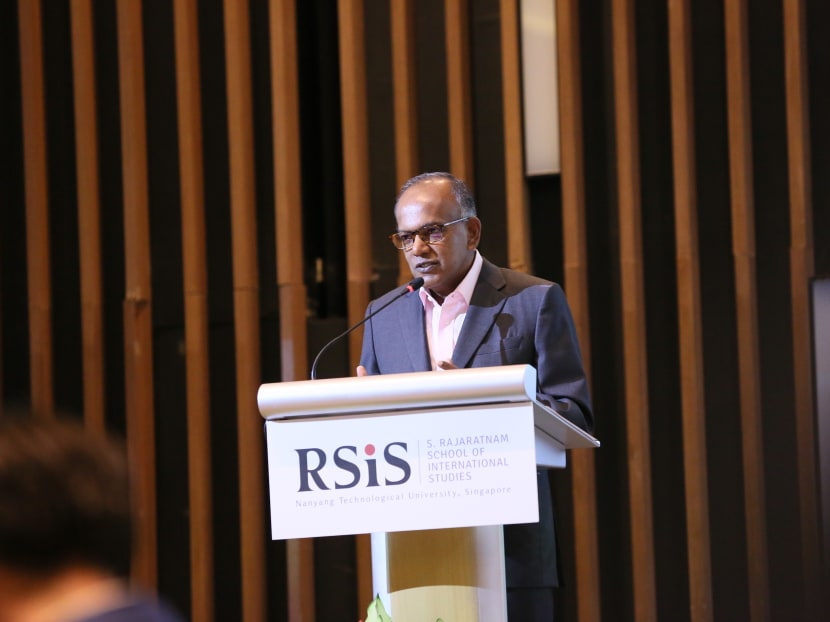Governments must lead fight against foreign interference, cannot rely on tech firms: Shanmugam
SINGAPORE — Governments must lead the fight against foreign interference in national affairs and cannot look to technology companies to solve the problem, Home Affairs Minister K Shanmugam said on Wednesday (Sept 25).

Singapore wants to work with technology companies to fight foreign influence in national affairs, Home Affairs and Law Minister K Shanmugam (pictured) said.
SINGAPORE — Governments must lead the fight against foreign interference in national affairs and cannot look to technology companies to solve the problem, Home Affairs Minister K Shanmugam said on Wednesday (Sept 25).
“Governments have to lead from the front and we need to ensure we have the right tools to fight this,” Mr Shanmugam, who is also Law Minister, said at a conference on foreign-interference tactics and countermeasures.
Stressing the need for laws to tackle the issue, he said that technology companies cannot be left to self-regulate in the absence of legislation.
“The responses (from technology companies) have been varied so far to the challenges that have come out — from denial that there are problems to taking some reasonably effective steps,” Mr Shanmugam told more than 200 people at the Parkroyal hotel on Beach Road.
The audience at the conference, organised by the S Rajaratnam School of International Studies, included academics, public servants, and representatives from civil society and the business world.
WHY TECH FIRMS CANNOT SELF-REGULATE
The business model of technology companies, which include social networks such as Facebook, “militates” against proper self-regulation, Mr Shanmugam said.
Higher profits are derived from having more users, content on their platforms and user attention that they can sell to advertisers.
“Removing fake users, removing fake accounts, investigating into co-ordinated inauthentic behaviour — these are all costly. Tech companies are in a position of conflict, where their business interests often conflict with what needs to be done in broader society’s interests,” he added.
Therefore, the Government here does not accept that those mired in such conflicts should decide for themselves the remedies or framework to deal with foreign interference.
Mr Shanmugam said that within countries, there will be laws that deal with how conflict of interest ought to be resolved in specific industries.
“It cannot be any different for technology companies.”
Singapore would still like to work with technology companies, which are partners and not opponents, he said.
He noted that Facebook boss Mark Zuckerberg had said in March that more regulations were necessary, but there was a need for global standards agreed by countries.
Mr Shanmugam believes that the different social, political and cultural contexts of each country will make broad international agreement “nearly impossible”.
“Do you expect the United States, Russia, China, for a start, to… agree on common standards on what’s not acceptable and what the common standards ought to be?” he asked.
While he said the suggestion that there could be laws was welcome, it is not very practical to propose that such legislation be based on universal standards.
PROTECTING NATIONAL INTERESTS
Mr Shanmugam described foreign interference as a matter of sovereignty and national security.
In this vein, every country has the sovereign right to decide how it should protect its national security, Mr Shanmugam said.
“The Government, with the consent of the people, will have to decide. Commercial companies cannot tell us what to do about this. They have to work within the framework of the law,” he said.
In his 45-minute speech, Mr Shanmugam made the point that foreign interference was an “age-old” practice that dates back thousands of years — glimpsed in China as early as 300BC and the Roman expansion in Greece in the second century BC — and is a basic principle of international relations.
In the present day, Mr Shanmugam noted that just last week, Hong Kong democracy activists had appeared before US lawmakers urging them to intervene in the city’s affairs.
CHEAP AND EFFECTIVE CAMPAIGNS
While foreign interference has a long history, the concept has now been “turbo-charged” because the Internet has opened up almost limitless possibilities to advance such interests.
It has made hostile information campaigns not only cheap, but easy and effective to mount, with an expanding commercial industry supporting those who want to spread content far and wide.
Some of these attempts, Mr Shanmugam noted, have been targeted squarely at influencing the outcome of elections or national referenda, including the 2016 US presidential vote.
Singapore’s next general election is due by April 2021.
Ultimately, Mr Shanmugam said that governments must have the right tools to deal with foreign interference. International co-operation will be needed as well.
“But I’m not holding my breath that… proper international co-operation with acceptable standards would materialise very quickly, but we hope that it would come through at some point in time.”











